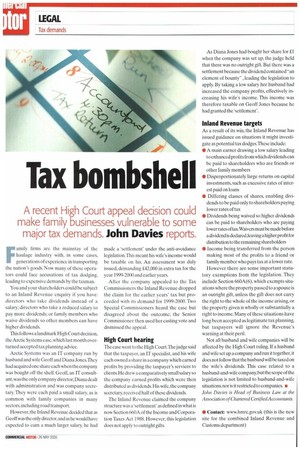Tax bo bshell
Page 38

If you've noticed an error in this article please click here to report it so we can fix it.
A recent High Court appeal decision could make family businesses vulnerable to some
major tax demands. John Davies reports.
Famity firms are the mainstay of the haulage industry with, in some cases, generations of experience in transporting the nation's goods. Now many of these operators could face accusations of tax dodging, leading to expensive demands by the taxman.
You and your shareholders could be subject to an Inland Revenue enquiry if you have: directors who take dividends instead of a salary; directors who take a reduced salary to pay more dividends; or family members who waive dividends so other members can have higher dividends.
This follows a landmark High Court decision, the Arctic Systems case, which last month overturned accepted tax planning advice.
Arctic Systems was an IT company run by husband and wife Geoff and Diana Jones.They had acquired one share each when the company was bought off the shelf. Geoff an IT consultant, was the only company director;Diana dealt with administration and was company secretary. They were each paid a small salary, as is common with family companies in many sectors,including road transport.
However, the Inland Revenue decided that as Geoff was the only director, and as he would have expected to earn a much larger salart he had made a 'settlement' under the anti-avoidance legislation. This meant his wife's income would he taxable on his. An assessment was duly issued, demanding /42,000 in extra tax for the year 1999-2000 and earlier years.
After the company appealed to the Tax Commissioners the Inland Revenue dropped the claim for the earlier years' tax but proceeded with its demand for 1999-2000. Two Special Commissioners heard the case but disagreed about the outcome; the Senior Commissioner then used her casting vote and dismissed the appeal.
High Court hearing
The case went to the High Court.The judge said that the taxpayer, an IT specialist, and his wife each owned a share in a company which earned profits by providing the taxpayer's services to clients. He drew a comparatively small salary so the company earned profits which were then distributed as dividends. His wife, the company secretary,received half of these dividends.
The Inland Revenue claimed the company structure was a 'settlement' as defined in what is now Section 660A of the income and Corporation Taxes Act 1988. However, this legislation does not apply to outright gifts. As Diana Jones had bought her share for £1 when the company was set up, the judge held that there was no outright gift. But there was a settlement because the dividend contained "an element of bounty" ,leading the legislation to apply. By taking a low salary her husband had increased the company profits, effectively increasing his wife's income. This income was therefore taxable on Geoff Jones because he had granted the 'settlement'.
Inland Revenue targets
As a result of its win., the Inland Revenue has issued guidance on situations it might investigate as potential tax dodges. These include: • A main earner drawing a low salary leading to enhanced profits from which dividends can be paid to shareholders who are friends or other family members • Disproportionately large returns on capital investments, such as excessive rates of interest paid on loans • Differing classes of shares, enabling dividends to be paid only to shareholders paying lower rates of tax • Dividends being waived so higher dividends can be paid to shareholders who are paying lowerrates of tax.Waivets must be made before a dividend is declared,leavinga higher profit for distribution to the remaining shareholders • Income being transferred from the person making most of the profits to a friend or family member who pays tax at a lower rate.
However there are some important statutory exemptions from the legislation. They include Section 660A(6), which exempts situations where the property passed to a spouse is an outright gift, unless the gift does not carry the right to the whole of the income arising, or the property given is wholly or substantially a right to income. Many of these situations have long been accepted as legitimate tax planning, but taxpayers will ignore the Revenue's warning at their peril.
Not all husband and wife companies will be affected by the High Court ruling. If a husband and wife set up a company and run it together, it does not follow that the husband will be taxed on the wife's dividends. This case related to a husband-and-wife company, hut the scope of the legislation is not limited to husband-and-wife situations, nor is it restricted to companies. • John Davies is Head of Business Law at the Association of Chartered CenifiedAccountants • Contact: www.hmrc.gov.uk (this is the new site for the combined Inland Revenue and Customs department)












































































































































































































































